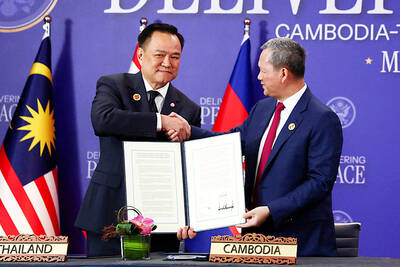British Prime Minister Boris Johnson’s staff are talking about an imminent general election as though it were a fact, but amid growing expectations that the next chapter in the UK’s political crisis is to see the country go to the polls, it is still not clear how it would happen.
The argument for an election is clear. Johnson has a governing majority in the British Parliament of just one seat, meaning that he does not have the votes to pass any controversial legislation.
It is also far from clear that there is a majority for any kind of Brexit deal, while British lawmakers are plotting to block his “do or die” plan to take Britain out of the EU on Oct. 31, without a deal if necessary.
Calling an election would stop those plots — lawmakers would cease to be lawmakers and would have to fight again for their seats — and could potentially deliver Johnson a majority.
The Conservatives see Johnson as an electoral asset, a politician who is also a celebrity.
If Johnson could argue that the election had been forced on him and fight a “parliament versus the people” campaign, the Tories hope that Johnson could sweep up voters frustrated that Brexit has not been delivered.
Yet, a prime minister can no longer go to the monarch and request an election. Under the 2011 UK Fixed-Term Parliaments Act, a national ballot can only be called if two-thirds of parliament opt for one, or if the government loses a confidence vote. Unless either of those happen, the next election is not scheduled until 2022.
If Johnson wants an election “to break the parliamentary deadlock, or get a mandate for a no-deal Brexit, then he will not only need the support of all of his party, but also a sizable chunk of opposition MPs,” said Maddy Thimont Jack of the Institute for Government. “A lot depends on when he calls it.”
Opponents of a no-deal Brexit fear that Johnson might go for a date just after Oct. 31, allowing Britain to leave the EU without a deal during the election campaign, when there would be no Parliament to stop it.
Opposition Labour leader Jeremy Corbyn has said that this would be “unconstitutional and anti-democratic.”
Labour’s backing, which Johnson needs given his wafer-thin majority, would likely depend on his agreeing to delay Brexit.
There is a potential way around the 2011 election law: To amend it, requiring only a simple majority in parliament. But it would also need the agreement of the upper House of Lords, and the timing of Brexit makes this complicated.

Shamans in Peru on Monday gathered for an annual New Year’s ritual where they made predictions for the year to come, including illness for US President Donald Trump and the downfall of Venezuelan President Nicolas Maduro. “The United States should prepare itself because Donald Trump will fall seriously ill,” Juan de Dios Garcia proclaimed as he gathered with other shamans on a beach in southern Lima, dressed in traditional Andean ponchos and headdresses, and sprinkling flowers on the sand. The shamans carried large posters of world leaders, over which they crossed swords and burned incense, some of which they stomped on. In this

‘NO COUNTRY BUMPKIN’: The judge rejected arguments that former prime minister Najib Razak was an unwitting victim, saying Najib took steps to protect his position Imprisoned former Malaysian prime minister Najib Razak was yesterday convicted, following a corruption trial tied to multibillion-dollar looting of the 1Malaysia Development Berhad (1MDB) state investment fund. The nation’s high court found Najib, 72, guilty on four counts of abuse of power and 21 charges of money laundering related to more than US$700 million channeled into his personal bank accounts from the 1MDB fund. Najib denied any wrongdoing, and maintained the funds were a political donation from Saudi Arabia and that he had been misled by rogue financiers led by businessman Low Taek Jho. Low, thought to be the scandal’s mastermind, remains

Near the entrance to the Panama Canal, a monument to China’s contributions to the interoceanic waterway was torn down on Saturday night by order of local authorities. The move comes as US President Donald Trump has made threats in the past few months to retake control of the canal, claiming Beijing has too much influence in its operations. In a surprising move that has been criticized by leaders in Panama and China, the mayor’s office of the locality of Arraijan ordered the demolition of the monument built in 2004 to symbolize friendship between the countries. The mayor’s office said in

FIGHTING CONTINUES: Thai military dropped 40 bombs on border areas, Cambodia said, while Bangkok said Phnom Penh launched heavy attacks and damaged homes Cambodia yesterday accused Thailand of intensifying its bombardment of disputed border areas, even as officials from the two countries attend a multi-day meeting aimed at negotiating an end to deadly clashes. The neighbors’ long-standing border conflict reignited this month, shattering an earlier truce and killing more than 40 people, according to official counts. About 1 million people have also been displaced. Cambodian and Thai officials were in their third day of talks at a border checkpoint, with ministers of defense from the two countries scheduled to meet today. However, the Cambodian Ministry of National Defense said Thailand’s military carried out a heavy